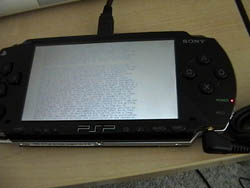 Not surprisingly, folks have already figured out how to read books on the new Sony PSP (PlayStation Portable). The hack is pretty basic – you just turn pages into jpeg images and dump them into the picture folder. The snapshots stack up as a book. Packet Switched Press has even published a short story – a sci-fi piece called “Moving Pictures” – formatted specially for the device (you’re supposed to rotate it 90 degrees to view vertically) (thanks, Boing Boing).
Not surprisingly, folks have already figured out how to read books on the new Sony PSP (PlayStation Portable). The hack is pretty basic – you just turn pages into jpeg images and dump them into the picture folder. The snapshots stack up as a book. Packet Switched Press has even published a short story – a sci-fi piece called “Moving Pictures” – formatted specially for the device (you’re supposed to rotate it 90 degrees to view vertically) (thanks, Boing Boing).
The PSP marks another step toward an ideal portable media device (see the ideal pod), the ebook hack being only one of many tricks to cram in more content options (Wired article for more). The Packet Switch Press story suggests that on the tiny screen, 90 degrees can be all that separates a widescreen movie from an electronic paperback – there’s no “this side up.” The big problem with the PSP is its proprietary file format, laughably named Universal Media Disc (UMD). To watch a movie on your PSP, you have to buy the UMD-formatted edition, even if you already own the DVD. This will ultimately inhibit the development of interesting new works for the tiny screen, clever hacks notwithstanding.
Category Archives: The Ideal Device?
the ideal pod
Yesterday, Boing Boing linked to five enticing design fantasies of future Apple products by design firm Pentagram:
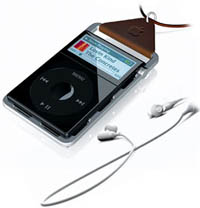
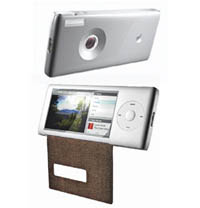
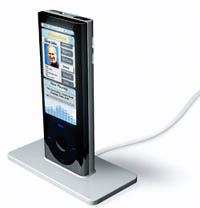
If Apple is to stay at the head of the pack, then the answer is to combine the wireless iPod, the vPod, and the iPhone into one ideal pod. In addition to having access to all your music, video and photos, you can surf the web, take movies and pictures, play video games, talk on the phone, watch films in letterbox format, and read various kinds of books – anything from novels, to newspapers, to websites, to manga or comics. IPod’s signature scroll wheel would work wonderfully with text, paging through horizontally and preserving some semblance of a coherent page or panel, like the International Herald Tribune does on its elegant website. It could have a little stylus tucked away like tweezers in a Swiss Army knife, and a virtual keyboard that projects on surfaces. A month ago, I wrote about the need for a “paperback ebook” – a pan-media everything-pod, something that does for portable media what paperbacks did for books. Perhaps Apple will be the first to venture such a device.
Laptops are on a collision course with cell phones. Eventually they will converge in a single ideal device. Specialized devices like snapshot digital cameras, iPods, Game Boys, and ebook readers are exciting while they are relatively new, but they are ultimately impractical. Nobody wants a device that just does one thing. Everyday, you have to pack your pockets with various gadgets – you begin to feel like a slave to the so-called convenience of these things. Phones and computers, on the other hand, are indispensable, and can theoretically encompass all of these specialized devices. So it seems like just a matter of time until everything is packed into one ideal pod.
paperback ebook
 Booktopia, a Korean ebook developer, is introducing a 29-title series for mobile users based on popular movie scenarios (article), including the recent Cannes hit Old Boy (thanks, textually.org). The books act as supplements to the films, with omitted material and glimpses behind-the-scenes, sort of like special features on a DVD (though it appears that they will be text-only). They also seem to riff on that weird tie-in genre of books adapted from the screen (I’ve always wondered who reads those books..).
Booktopia, a Korean ebook developer, is introducing a 29-title series for mobile users based on popular movie scenarios (article), including the recent Cannes hit Old Boy (thanks, textually.org). The books act as supplements to the films, with omitted material and glimpses behind-the-scenes, sort of like special features on a DVD (though it appears that they will be text-only). They also seem to riff on that weird tie-in genre of books adapted from the screen (I’ve always wondered who reads those books..).
So are phones the electronic book in embryo? If you are looking for innovation in form, what’s happening on cell phones and mobile devices is far more interesting than what you’ll find in the area of conventional “ebooks,” which generally are the kind of pdf nightmare Dan decribes in his post yesterday. But so far, these kinds of mobile books, or mbooks, are to literature what ring tones are to music. The cell phone has become a kind of cud for the distracted brain to chew – I can’t count how many people I see on the subway or waiting in lines simply fiddling with their phone settings. What seems to be developing on cell phones is a new kind of ephemera descended from the pamphlet, flyer, or broadsheet, which will be tightly interwoven with advertising (these Korean movie tie-ins do leg work for the actual films, just as the new 24 spinoff offered on Verizon plugs the Fox television series). But what about actual books? Serious reading to counterbalance all the fluff. Portable devices like phones and palm pilots lend themselves to the serial model. Their diminutive size makes them better suited to smaller chunks of material, and their access to networks allows them to constantly grab new chunks. But I don’t see why quality has to be sacrificed. Perhaps, with time, the tradition of serialized narrative will be reinvented in meaningful ways. Many of Dickens’s novels were published and written serially, and he was able to modulate the course of his writing according to reader response and sales. Digital content delivery over cell phones and the web could employ the same fluidity, delivering the book as it is becoming, and creating whole communities of readers on the web (see earlier post elegant map hack). An interesting prospect for writers as well as readers.
These literary experiments on the tiny screen are probably not trivial, even though the content may be. They seem to be saying “hurry up” to our more sophisticated but unwieldy reading devices like laptops and tablets. We need a kind of paperback ebook, in between a laptop and a smartphone – cheap and easy to tote. If I can comfortably read on this device in a crowded subway, then we might finally have something as handy as a paper book, conducive to any kind of content, with all the affordances of computers and the web. And ideally… I can write on it with a stylus, or on a keyboard that it projects on a tabletop, and I can dock it at a more powerful workstation in my office. I can plug in headphones or speakers and explore my music library, or surf satellite radio. I can watch a film that I made, or one that I downloaded, or I can flip through my photo album. If I’m lost, I can get a map with pictures of the place I’m trying to find. And at night, I can curl up with it in bed, reading by the light of its built-in candle. I may even have glasses I can plug in and read the book without hands, or look at images in 3-D like on a stereopticon. (Kim, I think I may have my fantasy ebook) Nothing could ever truly replace paper books for me, but a pan-media tablet – an everything device – might just become my everyday companion.
big plans for the tiny screen
Late last week, Random House announced it was making the microlit plunge, acquiring a “significant minority stake” in wireless applications developer VOCEL (AP wire story).
Says Random House Ventures president Richard Sarnoff: “You have a whole generation of consumers, perhaps more than a generation, who are never more than 10 feet from their cell phones, including when they shower. Increasingly, cell phones are becoming an appliance for entertainment and education.”
But, despite the success of cell phone novels and serials in Japan, South Korea and Germany, Sarnoff insists that tiny screens have a potential for information, but not for narrative. “The screens are inappropriate for that kind of sustained reading. That’s a `maybe, someday’ discussion. We’ll keep an eye on that area, and if something happens … we’ll certainly respond.”
So for the time being, Random House will be testing mobile phones for language instruction, test prep, and other informational services.
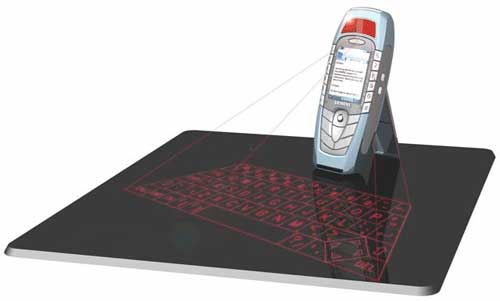
In a related vein, textually.org, an invaluable resource for the microlit observer, recently posted about Radio Shack‘s plans to sell stand-alone virtual keyboard units the size of a “small fist.” Virtual keyboards project a regular-sized typing area on a flat surface, registering keystrokes via Bluetooth onto a smartphone or personal digital assistant (PDA). VKB, the developer of the technology, recently announced its goal of making the virtual keyboard an embedded feature in mobile devices by next year. Further suggestion that cell phones and laptops are evolving into one another.
laptops for the masses
MIT Media Lab founder Nicholas Negroponte is developing a line of laptop computers that will sell for less than $100 a piece. The textbook of the future?….
>>BBC article
incredible shrinking book
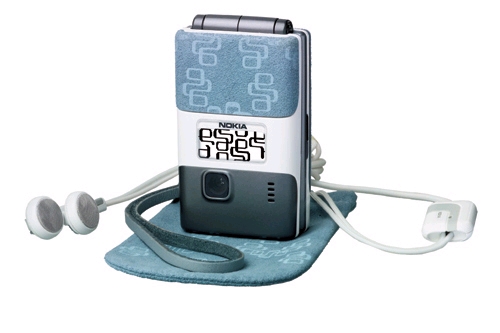 A couple morsels today on textually.org lending credence to our theory that cellphones/PDAs are the incubation niche for the eventual widespread adoption of ebooks. One on fashionable new casings Nokia is bringing out for mobile devices (re Kim’s leather-bound fantasy ebook). Another on plans by Chinese tech giant Lenovo to embed “mobile book software technology” into phones, allowing users to read fully illustrated books, as well as watch movies, listen to audio, play video games, and browse periodicals. Mobile phones are emerging, at least in China, as the ultimate mass-consumer media processor – affordable and eminently portable. And each year, notebook computers become lighter, sleeker, and easier to tote around. Are they just shrinking into palm pilots? How much serious work can you get done on a palm pilot?
A couple morsels today on textually.org lending credence to our theory that cellphones/PDAs are the incubation niche for the eventual widespread adoption of ebooks. One on fashionable new casings Nokia is bringing out for mobile devices (re Kim’s leather-bound fantasy ebook). Another on plans by Chinese tech giant Lenovo to embed “mobile book software technology” into phones, allowing users to read fully illustrated books, as well as watch movies, listen to audio, play video games, and browse periodicals. Mobile phones are emerging, at least in China, as the ultimate mass-consumer media processor – affordable and eminently portable. And each year, notebook computers become lighter, sleeker, and easier to tote around. Are they just shrinking into palm pilots? How much serious work can you get done on a palm pilot?
fantasy ebook
I’m still thinking about Steven Pemberton’s estimation of when and why the shift from paper book to ebook will occur. Perhaps we, the book loving public, are waiting for something more than just a perfect screen. The question is, what, exactly, are we waiting for? What would it take to make the ebook absolutely irresistible? To follow is my attempt to imagine the perfect ebook.
First, I want to read ebooks on a beautiful portable device. Smaller than my laptop, larger than my palm pilot (about the size and weight of an actual book). The cover should be soft leather that, when folded back, reveals a flawless screen with jewel-like resolution. I want to be able to store all the books I own in this “book” so that when I go on vacation, or when I go to work, or when I go to an artist colony, I can read whatever I’m in the mood for. If I happen to be driving my car, or cooking, or gardening, or if I happen to be blind, I want to be able to tell my book to read to me.
If I am taking a class on a particular book, or teaching a class on a particular book, I want to be able to access all the scholarly work that applies to that book. Furthermore, I want to be able to search all notations made on the passages I am interested in. And I want to be able to search the book itself: to copy and paste quotations into my paper (instead of having to retype them). I also want to be able to add my scholarly work to the corpus that is building around the book I am studying.
If I am looking for a new book to read, I want to be able to look at reviews and excerpts. I want to be able to access recommended reading lists that have been posted online by people whose taste I respect.
If I suddenly decide I want to read a book that is not part of my collection, I want to be able to download it from the internet through this device any time of day or night because I don’t feel like going to the bookstore.
Also, I need this device because I want to read all the newfangled multimedia ebooks that are coming out which combine text, image, video, and sound. I want to be able to “read” books that were written by visual artists in collaboration with writers and musicians. I want to be able to watch music videos that are starting to look like movies, movies that are beginning to read like books, and books that are morphing into songs.
If I really love a certain book, I want to be able to go to a blog where other people who love this book are talking about it. If there is a movie based on the book, I want to be able to download the movie and watch it on my leather bound electronic “book.” Also, my book should have a keyboard that slides out on the side, or it should have a touchscreen that I can write on, because I might want to make notes in the margins.
And I guess my book should have addresses, phone numbers, a calendar, and pictures of my son. It should allow me to surf the internet, send emails, listen to music, and type papers, because I don’t feel like carrying a bunch of other devices around.
the book is doomed
 “The book is doomed.” That was Steven Pemberton‘s definitive answer to my musings about the future of the book in the digital age. It was the end of the first day of an international conference on web design, we were at the Friday night conference dinner, eating a crè me brulee that had been set ablaze just minutes before, and I don’t mean the little blue acetylene flame that puffs out after a few seconds. The chef blasted our crè me brulee for several minutes with a torch that looked like something a forest ranger would use to execute a controlled burn.
“The book is doomed.” That was Steven Pemberton‘s definitive answer to my musings about the future of the book in the digital age. It was the end of the first day of an international conference on web design, we were at the Friday night conference dinner, eating a crè me brulee that had been set ablaze just minutes before, and I don’t mean the little blue acetylene flame that puffs out after a few seconds. The chef blasted our crè me brulee for several minutes with a torch that looked like something a forest ranger would use to execute a controlled burn.
So, I’m eating my crè me brulee, trying to understand this pronouncement; when someone like Steven Pemberton says that the book, in the digital age, is doomed, you have to take it seriously. He cites The Innovator’s Dilemma, by Clayton M. Christensen. The thesis, Pemberton explains, has to do with the process of innovation and adoption. A new invention has to find a niche market that will allow it to improve and develop. Once the new invention advances enough to allow it to compete with the entrenched technology it is quickly adopted. This often radically changes an industry. Pemberton gives computer printers as an example. Anyone remember the old dot matrix printers? They had gears on the side that fit into corresponding holes in the paper. Remember how slow they were and how poor the quality was? The introduction of the laser printer made vast improvements in printer quality and as soon as printer technology improved, a revolution in desktop publishing was made possible.
The book, Pemberton contends, will experience a similar sea-change the moment screen technology improves enough to compete with the printed page.
the ideal device
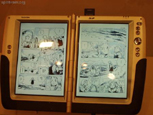


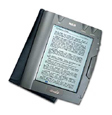
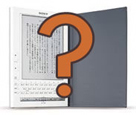
Bob wrote a couple of days ago about the new French Cybook – a sleek, but heavy, new ebook reader. Everyone interested in serious electronic books is waiting for the ideal device to come along, so that screen-based reading will be as comfortable paper-based. The benchmark for most is: “can I take it into bed with me?”  This is a very serious question (people who sleep with their laptops notwithstanding). But my hunch is that these successive generations of reading devices are missing the point. Who wants a device that is just for reading books? I don’t have a bag devoted exclusively to toting paper books. I carry many things together – books, pens, magazines, cds, maps, pictures, food etc. People are already using their cell phones for just about everything.
This is a very serious question (people who sleep with their laptops notwithstanding). But my hunch is that these successive generations of reading devices are missing the point. Who wants a device that is just for reading books? I don’t have a bag devoted exclusively to toting paper books. I carry many things together – books, pens, magazines, cds, maps, pictures, food etc. People are already using their cell phones for just about everything.
I think what we’re waiting for will be descended from laptops. They will likely resemble tablets, or even scrolls. It’s hard to predict. But take a look at this nice post at Word Munger from last year. I think this is on the right track.
Would love to hear some ideas….
new ebook sighting (hardware)
 a french company has released a new ebook, the Cybook, which seems to have a decent size-screen (10″ diagonal) and runs most of the e-book software formats.
a french company has released a new ebook, the Cybook, which seems to have a decent size-screen (10″ diagonal) and runs most of the e-book software formats.
but . . . it’s very heavy (2.2 pounds), has a relatively low resolution (72 dpi running at 800×600), won’t be visible outside; doesn’t come standard with wireless connectivity etc.
contrast to the Sony LIbrie which has similar dimensions but is only 1/4″ thick and weighs only 8oz., and uses an e-ink substrate rather than an LED so it is visible even in sunlight. of course the Librie is black and white, doesn’t support video, doesn’t connect to the net etc.
my guess is we’re still a couple of years away from a reading device that people can really get excited about.
